Related Research Articles

A big band or jazz orchestra is a type of musical ensemble of jazz music that usually consists of ten or more musicians with four sections: saxophones, trumpets, trombones, and a rhythm section. Big bands originated during the early 1910s and dominated jazz in the early 1940s when swing was most popular. The term "big band" is also used to describe a genre of music, although this was not the only style of music played by big bands.

James Melvin Lunceford was an American jazz alto saxophonist and bandleader in the swing era.
The swing era was the period (1933–1947) when big band swing music was the most popular music in the United States, especially for teenagers. Though this was its most popular period, the music had actually been around since the late 1920s and early 1930s, being played by black bands led by such artists as Duke Ellington, Jimmie Lunceford, Bennie Moten, Cab Calloway, Earl Hines, and Fletcher Henderson, and white bands from the 1920s led by the likes of Jean Goldkette, Russ Morgan and Isham Jones. An early milestone in the era was from "the King of Swing" Benny Goodman's performance at the Palomar Ballroom in Los Angeles on August 21, 1935, bringing the music to the rest of the country. The 1930s also became the era of other great soloists: the tenor saxophonists Coleman Hawkins, Ben Webster and Lester Young; the alto saxophonists Benny Carter and Johnny Hodges; the drummers Chick Webb, Gene Krupa, Jo Jones and Sid Catlett; the pianists Fats Waller and Teddy Wilson; the trumpeters Louis Armstrong, Roy Eldridge, Bunny Berigan, and Rex Stewart.
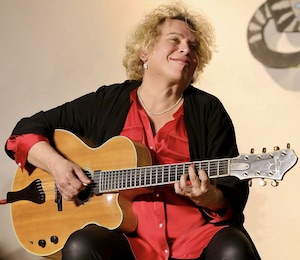
Howard Vincent Alden is an American jazz guitarist born in Newport Beach, California. Alden has recorded many albums for Concord Records, including four with seven-string guitar innovator George Van Eps.
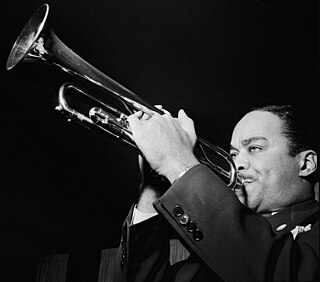
Wilbur Dorsey "Buck" Clayton was an American jazz trumpeter who was a member of Count Basie's orchestra. His principal influence was Louis Armstrong, first hearing the record "Confessin' that I Love You" as he passed by a shop window.

Adolphus Anthony Cheatham, better known as Doc Cheatham, was an American jazz trumpeter, singer, and bandleader. He is also the grandfather of musician Theo Croker.

The Count Basie Orchestra is a 16- to 18-piece big band, one of the most prominent jazz performing groups of the swing era, founded by Count Basie in 1935 and recording regularly from 1936. Despite a brief disbandment at the beginning of the 1950s, the band survived long past the big band era itself and the death of Basie in 1984. It continues under the direction of trumpeter Scotty Barnhart.

Robert Sage Wilber was an American jazz clarinetist, saxophonist, and band leader. Although his scope covers a wide range of jazz, Wilber was a dedicated advocate of classic styles, working throughout his career to present traditional jazz pieces in a contemporary manner. He played with many distinguished jazz leaders in the 1950s and 1960s, including Bobby Hackett, Benny Goodman, Sidney Bechet, Jack Teagarden and Eddie Condon. In the late 1960s, he was an original member of the World's Greatest Jazz Band, and in the early 70s of Soprano Summit, a band which gained wide attention. In the late 1970s, he formed the Bechet Legacy Band.

Biréli Lagrène is a French jazz guitarist who came to prominence in the 1980s for his Django Reinhardt–influenced style. He often performs in swing, jazz fusion, and post-bop styles.
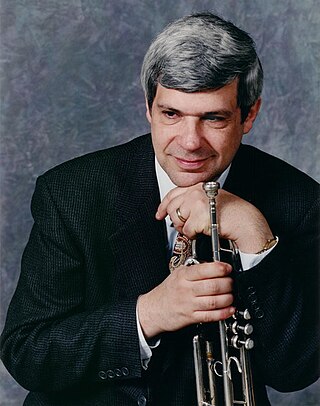
Jay Randall Sandke is a jazz trumpeter and guitarist.

Grover Mitchell, born Grover Curry Mitchell was an American jazz trombonist who led the Count Basie Orchestra.

Michael Arthur LeDonne is an American jazz pianist, organist, composer, and educator. Having played with Benny Goodman, Milt Jackson, and Benny Golson in various stages of his career, he now leads several of his own groups and frequently performs around the world.
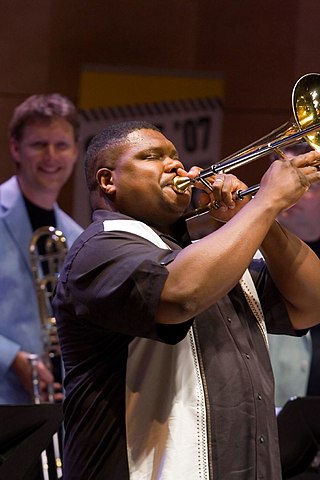
Wycliffe A. Gordon is an American jazz trombonist, arranger, composer, band leader, and music educator at the collegiate-conservatory level. Gordon also sings and plays didgeridoo, trumpet, soprano trombone, tuba, and piano. His nickname is "Pinecone".

Charles J. Thornton, Jr., known professionally as Butch Miles, was an American jazz drummer. He played with the Count Basie Orchestra, Dave Brubeck, Ella Fitzgerald, Sammy Davis Jr., Frank Sinatra, Lena Horne, and Tony Bennett.

Taft Jordan was an American jazz trumpeter.
Charles Dee Wilson was an American jazz alto saxophonist.
Joel Edward Helleny was an American jazz trombonist.
The Widespread Depression Orchestra was a nine-piece jazz ensemble founded in 1972 at Vermont's Marlboro College.
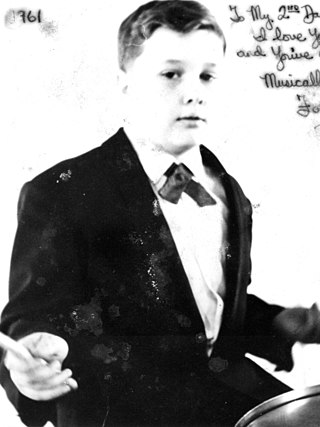
Duff Clark "Duffy" Jackson was an American jazz drummer.
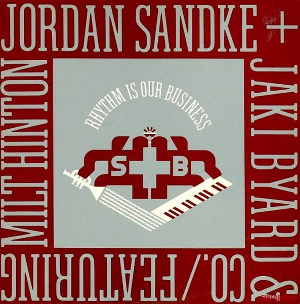
Rhythm Is Our Business is an album by trumpeter and cornetist Jordan Sandke, recorded in 1985.
References
- ↑ "Picks and Pans Review: Rhythm Is Our Business" (September 8, 1986). People.
- 1 2 Wilson, John S. (March 2, 1988) "Jazz: Sandke Quartet". The New York Times.
- ↑ Kennedy, Gary (2002). Kernfeld, Barry (ed.). The New Grove Dictionary of Jazz. Vol. 3 (2nd ed.). New York: Grove's Dictionaries Inc. p. 498. ISBN 1-56159-284-6.
- 1 2 Fitzgerlad, Michael (October 2, 2011) "Jordan Sandke Leader Entry". jazzdiscography.com.
- ↑ Wilson, John S. (December 26, 1980) "Jazz: Depression Quintet". The New York Times. p. C18.